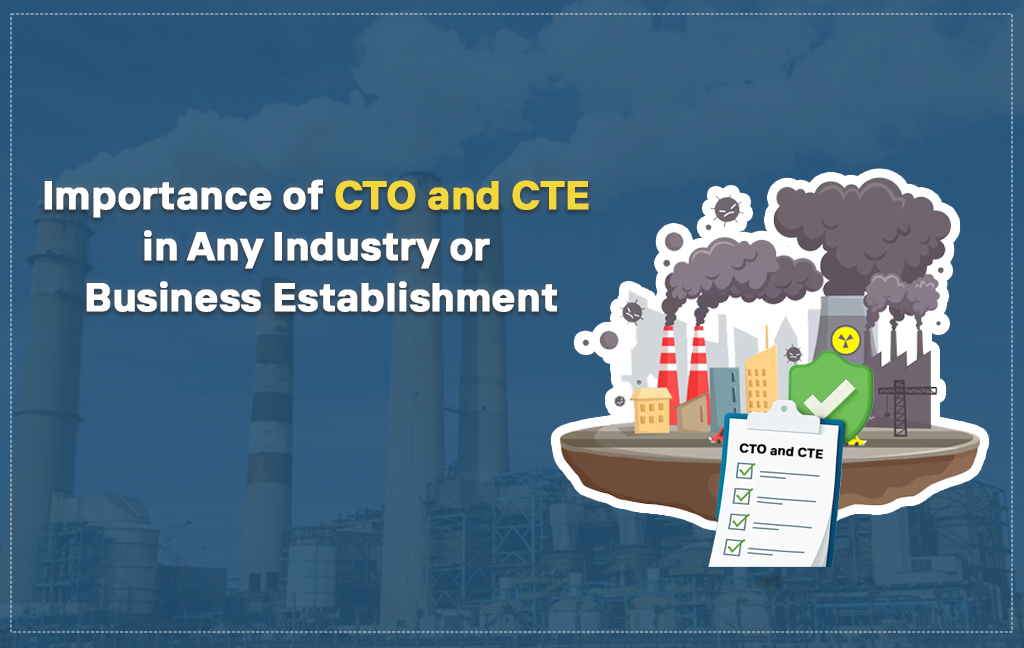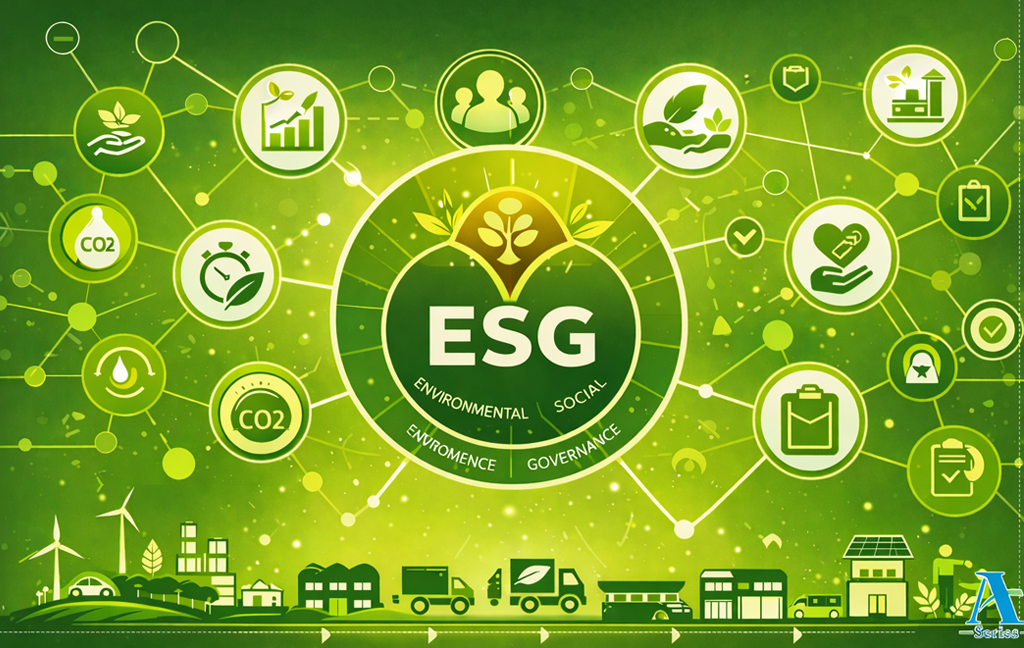Importance of CTO and CTE in Any Industry or Business Establishment

Introduction
In India, any industry or business that can potentially cause pollution whether through emissions, effluents, or waste generation must obtain prior environmental permissions before beginning operations. These essential approvals are:
- Consent to Establish (CTE) is obtained before setting up an industry or unit, and
- Consent to Operate (CTO) is obtained before starting operations or production.
These consents are issued by the State Pollution Control Boards (SPCBs) or Pollution Control Committees (PCCs), depending on the state or union territory.
Both CTE and CTO are mandatory under:
- The Water (Prevention and Control of Pollution) Act, 1974
- The Air (Prevention and Control of Pollution) Act, 1981
- The Environment (Protection) Act, 1986
Together, they ensure that industries are not only legally compliant but also operate responsibly towards the environment.
What is CTE (Consent to Establish)?
CTE, also known as No Objection Certificate (NOC) for establishment, is required before an industry starts construction, installation of machinery, or any site development.
It is the first step in the environmental clearance process.
Purpose of CTE:
- To verify whether the proposed site and design are suitable from an environmental standpoint.
- To ensure pollution control systems are included in the project design.
- To prevent environmental damage before industrial activity begins.
Documents Required for CTE:
- Site plan and project layout
- Details of manufacturing process and raw materials
- Water, air, and waste generation details
- Proposed treatment and control measures (ETP/STP/APCD)
- Land documents or lease deed
- Undertaking on compliance with applicable acts
Validity of CTE:
CTE is generally valid for 1 to 5 years, depending on the project category and state policy. The industry must complete setup and apply for CTO within this period.
What is CTO (Consent to Operate)?
CTO is the authorization that allows an industry to start operation or production activities after installation and commissioning.
This consent ensures that:
- Pollution control equipment (ETP/STP/APCD) are installed and functioning effectively.
- Emission and effluent levels are within permissible limits.
- Waste disposal systems are compliant with environmental norms.
Documents Required for CTO:
- Copy of valid CTE
- Compliance report of CTE conditions
- Latest environmental monitoring results (air, water, noise, soil)
- Waste management plan (solid, hazardous, or e-waste)
- DG set details and energy consumption report
- Environmental audit or self-certification report
Classification of Industries
The Central Pollution Control Board (CPCB) classifies industries into four categories based on their Pollution Index (PI) to regulate them according to their pollution potential. Industries with a PI above 60 falls under the Red Category, including highly polluting sectors like petrochemical, cement, iron & steel, and thermal power plants. The Orange Category (PI between 41–59) covers moderately polluting industries such as food processing, dairy, textile dyeing, and automobile servicing. The Green Category (PI between 21–40) includes low-pollution industries like bakeries, assembly units, and solar panel manufacturing. Lastly, the White Category (PI up to 20) comprises non-polluting activities such as handicrafts, software units, and educational institutions, which are exempted from CTE and CTO but must submit an undertaking of compliance. This classification ensures balanced environmental regulation and promotes sustainable industrial growth.
Validity of CTO:
The validity of CTO differs based on industry type:
- Red Category: 5 years
- Orange Category: 10 years
- Green Category: 15 years
After expiry, industries must apply for renewal at least 90 days before the due date to avoid penalties.
Step-by-Step Process to Obtain CTE and CTO
Step 1: Application Submission
The industry must apply online through the respective State Pollution Control Board portal (e.g., Haryana HEPC, UPPCB, GPCB, MPCB).
Step 2: Document Review and Scrutiny
The SPCB reviews submitted details, layout, and pollution control measures.
Step 3: Site Inspection (for CTE)
An environmental officer inspects the proposed site to verify environmental suitability and compliance readiness.
Step 4: Grant of CTE
If all documents and inspection reports meet standards, CTE is issued.
Step 5: Installation and Setup
The industry sets up the plant, machinery, and pollution control systems as per approved plans.
Step 6: Application for CTO
After setup, the unit applies for CTO along with environmental monitoring reports and photographs.
Step 7: Site Verification (for CTO)
A final inspection is conducted to ensure installation of pollution control equipment and compliance with CTE conditions.
Step 8: Grant of CTO
Once verified, SPCB issues CTO with specific discharge and emission limits and compliance conditions.
Penalties for Non-Compliance
Operating without valid CTE or CTO is a serious offense under Indian law.
Penalties may include:
- Closure orders from the Pollution Control Board
- Prosecution under Section 33A of the Water Act and Section 31A of the Air Act
- Financial penalties and disconnection of utilities (water, electricity)
- Environmental compensation charges by CPCB/SPCB
Benefits of Having Valid CTE and CTO
- Legal Compliance and Protection: Helps industries avoid penalties, closure notices, and legal action.
- Environmental Responsibility: Ensures effective pollution control and promotes sustainable operations.
- Business Credibility: Builds trust among clients, investors, and regulatory authorities.
- Financial and Operational Advantage: Facilitates access to loans, tenders, and statutory approvals.
- Alignment with ESG and CSR Goals: Strengthens the organization’s sustainability and corporate responsibility profile.
Renewal and Amendment of CTO
- Renewal: Apply 90 days before expiry.
- Amendment: In case of change in product, capacity, fuel type, or emission source, industries must apply for CTO amendment.
- Continuous Monitoring: Some industries (especially in red category) must install Online Continuous Emission Monitoring Systems (OCEMS) linked to the SPCB server.
Conclusion
CTE and CTO are not just regulatory obligations they are pillars of environmental sustainability. They ensure industries grow responsibly, safeguard natural resources, and contribute to cleaner air and water for all.
Without these consents, industrial operations risk heavy penalties and environmental harm.
Call to Action
Ensure your business stays compliant, sustainable, and legally secure with expert environmental guidance.
Aseries Envirotek India Pvt. Ltd., India’s leading environmental compliance execution company, offers end-to-end support for obtaining CTE (Consent to Establish) and CTO (Consent to Operate), pollution control planning, and all statutory approvals under environmental laws.
Headquartered in Lucknow with a strong presence in Noida, we proudly provide compliance services across India, helping industries operate responsibly and meet every regulatory requirement with confidence.






